Task 1 (10 points) Complete the sentences with the verbs in Present Perfect.
1. She (twist) her ankle again.
2. Your sister (just / arrive).
3. (you / hear) the news yet?
4. Jane (never / travel) by plane before.
5. Our new neighbors (already / move) in.
Task 2 (15 points).
Form the opposite adjectives to complete the sentences. Mind the form of the indefinite article.
1. This is a (legal) activity.
2. That is a (direct) question.
3. It is important to learn about (regular) verbs.
4. This question was (logical) so I got confused.
5. For a moment I thought he was (sane), but it turned out that he had a wasp in his pocket.
Task 3 (15 points).
Complete the sentences with the Comparative or Superlative form of the Adjectives in brackets.
1. Mary is (good) at playing board games than the rest of the company.
2. Garry enjoys reading (much) than his brothers.
3. Sam had (old) car in town.
4. The delivery boy was (fast) as always.
5. Karen wants to be (good) doctor when she grows up.
Task 4 (20 points).
Find nine words referring to film genres in the box. Write the words in alphabetical order. Translate these words.
1.
2.
3.
4.
5.
6.
7.
8.
9.
Task 5 (20 points).
Complete the sentences with tag-questions.
1. The police found some fingerprints on the wall, ?
2. Canterbury was a roman town once, ?
3. It has been a lot of rain this spring, ?
4. That didn’t seem a very important book, ?
5. Jenny hadn’t arrived when we got to sleep, ?
6. Nothing interesting happens this week, ?
7. I’m not disturbing you with my presence, ?
8. Your mum has been working in this factory for a long time, ?
9. Hens can fly for short distances, ?
10. You have never been to Sweden, ?
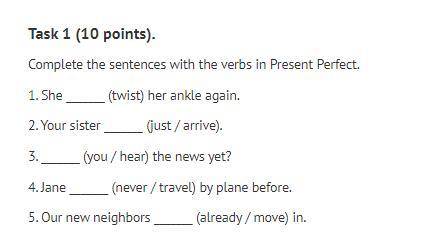
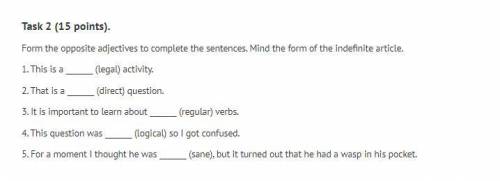
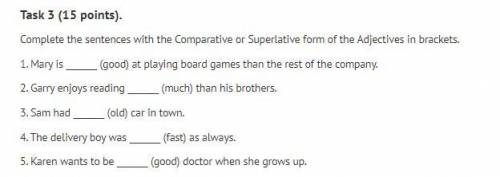
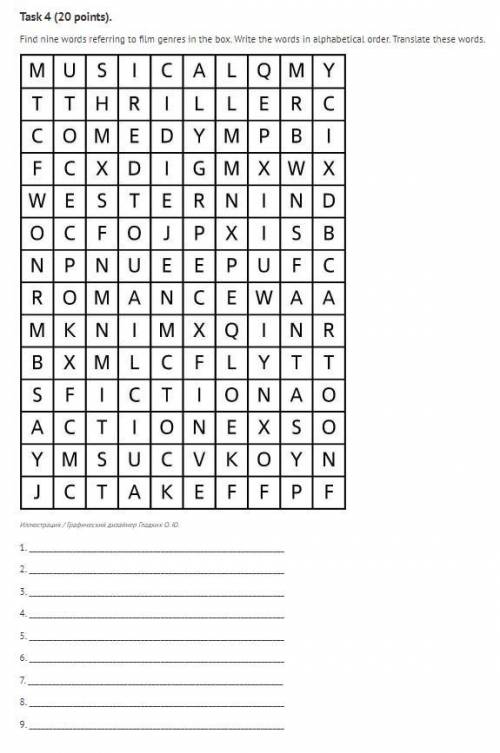
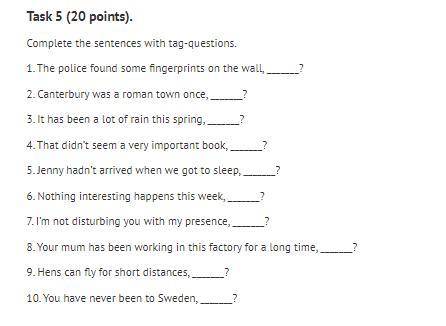
Другие вопросы по теме Английский язык
Популярные вопросы
- 5. при каких натуральных а верно равенство а³=10а²?...
3 - Какая сила вызывает оползни сели или камнепады в горах...
3 - На сторонеи bc треугольника abc отметили точку м так, что bc: mc=2: 1.биссиктриса...
3 - Какой корень у слова самоотверженный...
3 - Длина прямоугольника 24 см, ширина-на 8см меньше найди периметр прямоугольника...
3 - Первая российская революция. дата начала, окончания. причины. итоги....
3 - Прочитай текст.вставь имена собственные...
3 - ). 1) в автобусе ехало 14 человек. на остановке в автобус вошло несколько человек,...
2 - Номер 8 и номер 9 номер 8 стороны прямоугольника равны 8 см и x см , а его периметр...
3 - Крупные природные регионы расположенные в азиатской части россии какие...
1
1. She has twisted her ankle again.
Explanation: Present Perfect is used to talk about an action that happened in the past and is still relevant or has an impact on the present. In this case, the action of twisting her ankle has happened recently and is still affecting her.
2. Your sister has just arrived.
Explanation: The adverb "just" indicates that the action of your sister's arrival happened very recently. Present Perfect is used to talk about recent past actions or events.
3. Have you heard the news yet?
Explanation: Present Perfect is used to talk about actions or events that happened in the past but have a connection to the present. In this case, the action of hearing the news is relevant to the present moment.
4. Jane has never traveled by plane before.
Explanation: Present Perfect is used to talk about experiences or actions that have not happened in the person's past up to the present moment. In this case, Jane's lack of experience in traveling by plane is emphasized.
5. Our new neighbors have already moved in.
Explanation: "Already" indicates that the action of moving in has happened before the present moment. Present Perfect is used to talk about completed actions that happened in the past, but the exact time is not specified.
Task 2:
1. This is an illegal activity.
Explanation: The opposite of "legal" is "illegal". The indefinite article "an" is used before the adjective.
2. That is an indirect question.
Explanation: The opposite of "direct" is "indirect". The indefinite article "an" is used before the adjective.
3. It is important to learn about irregular verbs.
Explanation: The opposite of "regular" is "irregular". The form of the indefinite article remains the same.
4. This question was illogical, so I got confused.
Explanation: The opposite of "logical" is "illogical". The form of the indefinite article remains the same.
5. For a moment I thought he was insane, but it turned out that he had a wasp in his pocket.
Explanation: The opposite of "sane" is "insane". The form of the indefinite article remains the same.
Task 3:
1. Mary is better at playing board games than the rest of the company.
Explanation: Comparative form of "good" is "better". It is used to compare two things or people.
2. Garry enjoys reading much more than his brothers.
Explanation: Comparative form of "much" is "more". It is used to compare the degree or intensity of something.
3. Sam had the oldest car in town.
Explanation: Superlative form of "old" is "the oldest". It is used to describe the highest degree or extreme of something.
4. The delivery boy was as fast as always.
Explanation: Comparative form of "fast" is "as fast as". It is used to compare two things that have the same degree of the quality.
5. Karen wants to be the best doctor when she grows up.
Explanation: Superlative form of "good" is "the best". It is used to describe the highest degree or extreme of something.
Task 4: (Words referring to film genres to be filled in alphabetical order)
1. Action - действие
2. Comedy - комедия
3. Drama - драма
4. Fantasy - фэнтези
5. Horror - ужасы
6. Mystery - тайна
7. Romance - романтика
8. Sci-fi - научная фантастика
9. Thriller - триллер
Task 5:
1. The police found some fingerprints on the wall, didn't they?
Explanation: A tag-question is used to confirm or seek confirmation about a statement. In this case, the statement is positive, so the tag-question is negative ("didn't they?").
2. Canterbury was a Roman town once, wasn't it?
Explanation: The tag-question is seeking confirmation about a statement. In this case, the statement is positive, so the tag-question is negative ("wasn't it?").
3. It has been a lot of rain this spring, hasn't it?
Explanation: The tag-question is seeking confirmation about a statement. In this case, the statement is positive, so the tag-question is negative ("hasn't it?").
4. That didn’t seem a very important book, did it?
Explanation: The tag-question is seeking confirmation about a statement. In this case, the statement is negative, so the tag-question is positive ("did it?").
5. Jenny hadn’t arrived when we got to sleep, had she?
Explanation: The tag-question is seeking confirmation about a statement. In this case, the statement is negative, so the tag-question is positive ("had she?").
6. Nothing interesting happens this week, does it?
Explanation: The tag-question is seeking confirmation about a statement. In this case, the statement is negative, so the tag-question is positive ("does it?").
7. I'm not disturbing you with my presence, am I?
Explanation: The tag-question is seeking confirmation about a statement. In this case, the statement is negative, so the tag-question is positive ("am I?").
8. Your mum has been working in this factory for a long time, hasn't she?
Explanation: The tag-question is seeking confirmation about a statement. In this case, the statement is positive, so the tag-question is negative ("hasn't she?").
9. Hens can fly for short distances, can't they?
Explanation: The tag-question is seeking confirmation about a statement. In this case, the statement is positive, so the tag-question is negative ("can't they?").
10. You have never been to Sweden, have you?
Explanation: The tag-question is seeking confirmation about a statement. In this case, the statement is negative, so the tag-question is positive ("have you?").